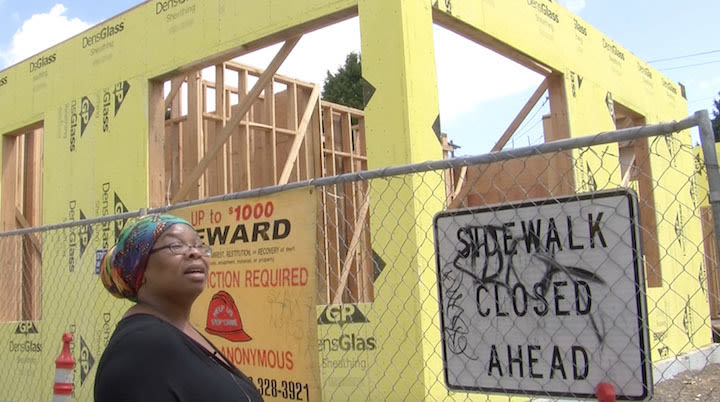Documentary Priced Out Grapples with Gentrification in Northeast Portland

Nikki Williams takes in the changes in her Northeast Portland neighborhood in a scene from Priced Out.
Image: Courtesy Priced Out
“What does the word gentrification mean to you?” asks filmmaker Cornelius Swart in the opening seconds of his new documentary Priced Out. The camera snaps to a close-up of Albina resident Michelle Lewis as she answers with three short, considered words. “Pain. Loss. Grief.”
The film, which premiered at the 2017 Northwest Filmmakers' Festival, works in part as a sequel to Swart’s 2002 film NorthEast Passage. That documentary followed another Albina resident, Nikki Williams, as she fought crime and the drug trade to make her Northeast Portland neighborhood safe for herself and her child. Fifteen years on, Swart revisits Williams—and the neighborhood he shares with her—and finds a very different story of displacement, gentrification, and, in Lewis’s words, pain, loss, and grief.
We spoke to Swart about his changing neighborhood, Portland’s housing crisis, and why he calls himself a gentrifier. His film screens Thursday, May 2, at Alberta Co-op Grocery.
Tell us about the first film, NorthEast Passage, and how it serves as a prequel to your new work.
We started that first one in 1997. It took five years to complete. It’s about Nikki Williams—who is also in the second film. She moves into a house that she owns—it’s given to her by Habitat for Humanity—five blocks from my house. She grew up in the neighborhood, is a single mom, and she is not concerned about gentrification. She is concerned about all the crime on her street. We see her organizing crime-fighting efforts over the course of about six months, and starting to clean up and close down some of the crack houses and drug houses on her block. An affordable housing developer has a proposal for an affordable housing unit at the end of her block. Nikki joins the neighborhood association that fights the development of the affordable housing complex, because she’s afraid that will bring more drugs onto her street. They fight and win and stop the development from coming in. The film ends with Nikki saying, "Bring on the gentrification! I’ve had enough of the decline, the disinvestment, and the crime in this neighborhood. I’m eager to see new people come in and new investment come in."
Fifteen years later, she comes to me and says, "Please do a sequel, I had no idea it was going to turn out this way."
Priced Out [Trailer Fall 2017] from Priced Out Documentary on Vimeo.
What was your approach going into the second film?
The only thing we had in mind was trying to document or illustrate Nikki’s journey from being pro-gentrification to being anti-gentrification—tracking that change and covering a bit of the history of the neighborhood so that people had a proper lens through which to understand Nikki’s experience. We didn’t know where it was going to go. The film that we’ve got was much different than anything we would have expected.
How so?
Well, I wound up being the central character, and at the beginning of the film I introduce myself as a gentrifier. I knew I was going to have to be in the film in some way—I didn’t think I was going to wind up being the narrator of the film. But the only real surprise was that the housing crisis overtook us. I went in thinking, "We’ll do this documentary and it will be quick, and it will be about Nikki and people will see the change. It’ll be a time-lapse portrait of the neighborhood." But as soon as we started production we entered into what would later be called the housing crisis.
That must have changed the shape of the movie in some way.
By the fall of 2015 the city of Portland was officially declaring a housing crisis. People started taking to the streets and demonstrating, going on rent strike, and it became the number-one issue in the city of Portland. We wound up having to pivot a little bit from a neighborhood-focused documentary to something that was about the city as a whole, and how the two connect. What’s the difference between the cultural gentrification that’s happening in Albina and the housing crisis that’s happening all around the city to people of all races and cultures?
Did it make for a better film?
It made it relevant to everybody, but we lost our story often to the daily news. Things that we started planning for were just an exhausted story that everybody knew about by the time we would finish the film. So we shied away from covering current events too much and focused more on history. But even the history of the black community has been discussed a lot in the last three years. I think you’ll see it in this film in a way that allows you to see where you sit in that history, and how that history got us here in terms of housing.
You call yourself a gentrifier at the outset, and talk about buying a house in Northeast Portland. How does that make you feel, given how much pain that is seen to generate in Priced Out?
It’s better to call yourself a gentrifier than to try to come off sounding as though you’re not involved in the issue. So many people who live in the central city now are involved in gentrification one way or the other. They’re benefiting either on the fringes of their lives or it’s a central part of how they came to be here, or they’re being impacted by it. It’s like saying I’m not a participant in the free market or I am not a participant in government programs. I just try to be honest about it. I was very conflicted when I bought the house. It was not where I wanted to buy a house, for two reasons: It wasn’t the best neighborhood in the city, and I say that in the documentary. I say I didn’t want to live here. And also I was doing a documentary about the neighborhood, so I didn’t want to be part of the story. But it was what I could afford, and we had already been evicted from one place. I had a two-year-old daughter, and I had to make a choice. I don’t regret the choice.
Did anything change for you through the making of the film?
What changed is just that I too became weary of the neighborhood. I always liked my older neighbors better. I never felt the kind of alienation that people were talking about in the film, and I still don’t, in no way do I feel the same thing that they do, but I have become weary with the new people and the new growth. I’m in a very fortunate position, I’m not going to lose my home, but I do feel a sense of weariness with the direction the neighborhood is gone.
Who do you see as the audience for Priced Out?
It’s for people who live in cities. Everyone who lives in central Portland has been touched by this issue whether they realize it or not. It’s for these urban residents, whether they’re black, white, or brown, whatever their income is. It’s a story of many many midsize cities that are expanding through gentrification now, so it’s also a story for cities that are on different parts of the gentrification curve. This is for Portland residents but also other cities that want to learn from Portland’s mistakes.
What do you think we can do to address the issues raised in this movie?
What people can do is get engaged and remain engaged, because local governments have tried and proposed and promised solutions in the past, but without the public constantly breathing down the neck of public officials, the ball will be dropped.
You just have to grind it out. There are no easy answers. As a population, as a city, as a civic group, Portlanders just have to keep attacking this problem. This is a city that had a different road than the rest of the country took with sprawl—we took a different direction. We became famous for not accepting suburban growth the way other people had accepted and promoted it. I think the opportunity is that Portland could do the same thing with gentrification, but it doesn’t happen overnight. It’s a decades-long battle.
Priced Out
7 p.m. Thu, May 2, Alberta Co-op Grocery, FREE




